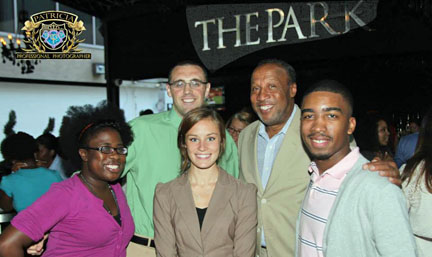CRISP hosted our first student networking event Friday evening at the stylish Park at 14th which drew several dozen social work students from the area’s schools with high representation from Howard University and the University of Maryland. There were out-of-state students as well including Kathleen Algire-Fedarcyk from Columbia University where I graduated in 2002. It was an electric event. The students were excited about CRISP being on the scene. As I spoke with them, they all said they were there because they want to make changes in our society. And they are not content with being direct service providers or administrators; they want to be policymakers.
 These millennial social workers—ages 18 to 30 years old—want to engage the government and, if they must, they will have no problem running for elected office. A couple told me their ultimate goals were to seek elective office. They understand the importance of the policies that shape the workplace for social workers and the communities that many of the people they want to help are consigned to. They embody the spirit of Jane Addams, Ed Towns, Ron Dellums and his protégé Barbara Lee. They find the status quo unacceptable and they feel social workers have an obligation to change society.
These millennial social workers—ages 18 to 30 years old—want to engage the government and, if they must, they will have no problem running for elected office. A couple told me their ultimate goals were to seek elective office. They understand the importance of the policies that shape the workplace for social workers and the communities that many of the people they want to help are consigned to. They embody the spirit of Jane Addams, Ed Towns, Ron Dellums and his protégé Barbara Lee. They find the status quo unacceptable and they feel social workers have an obligation to change society.
The event was organized by two of CRISP’s millennials—Executive Director Dr. Angela Henderson and CRISP board member Sara Brown. If these young people who showed up Friday are among the future leaders of social work, I have a feeling the profession will be much different than the present. They are the technology-savvy generation. They are accustomed to connecting with broad swaths of society. They have friends and acquaintances across the globe. They believe they have the wherewithal to make big changes in society. That they chose social work as their profession is encouraging.
Millennials in the United States are quite different than preceding generations. They tend to be more progressive, more tolerant of different races and ethnicities and are inclined to be more socially and politically active. According to the Pew Research Center for the People & the Press, millennials are much further to the left than previous generations. They are more likely to favor government involvement to help people than older generations. Unlike the Baby Boom generation, millennials are less likely to see government as problematic or inefficient. While more boomers would like to see the Affordable Care Act repealed, more millennials would like to see it expanded. While less likely to marry, they strongly support the rights of gay to marry. They support Social Security and Medicare more or less the same as the general public but they are less concerned about reducing the debt than preserving entitlements. The full report is available on the Pew website.
Their political activism was on display in the 2012 elections. According to the Center for Information & Research on Civic Learning and Engagement (CIRCLE), about half of the 18-29 year olds eligible to vote turned out in the 2012 presidential election. Not only did they turn out, they turned out where it mattered. In toss-up states, 58 percent of young voters showed up at the polls and in states that were leaning, 55 percent turned out, compared to 47 percent in non-battleground states. CIRCLE credits young voters for making the difference in the key battleground states of Ohio, Florida, Virginia and Pennsylvania. You can get the full report on their website.
As I said in a previous post, the beauty of social work is its breadth—from those who provide direct services to the most vulnerable children, families and individuals, to those who manage public welfare systems and nonprofit service organizations, to those in academia and research institutes, and those who serve in elected office and as government officials. There is a great demand for more social workers—both micro and macro. Despite the tension between cause and function, recruiting more social workers should not be looked at as a zero sum game.
We are seeing an enthusiasm about influencing policy that should attract more millennials who might choose a profession other than social work if they want to be policymakers. The profession needs to take a closer look at this dynamic and work towards creating career paths for more macro social work students seeking careers in policy.
Written by Dr. Charles E. Lewis Jr.
President of The Congressional Research Institute for Social Work and Policy
The post Social Work and the Rise of the Millennials appeared first on Congressional Research Institute for Social Work and Policyand has been syndicated with permission of the author.
Sources:
Our authors want to hear from you! Click to leave a comment
Related Posts






I’m a baby boomer and for the millennials if what I read is true, in general. This is heartening. Go millennials!